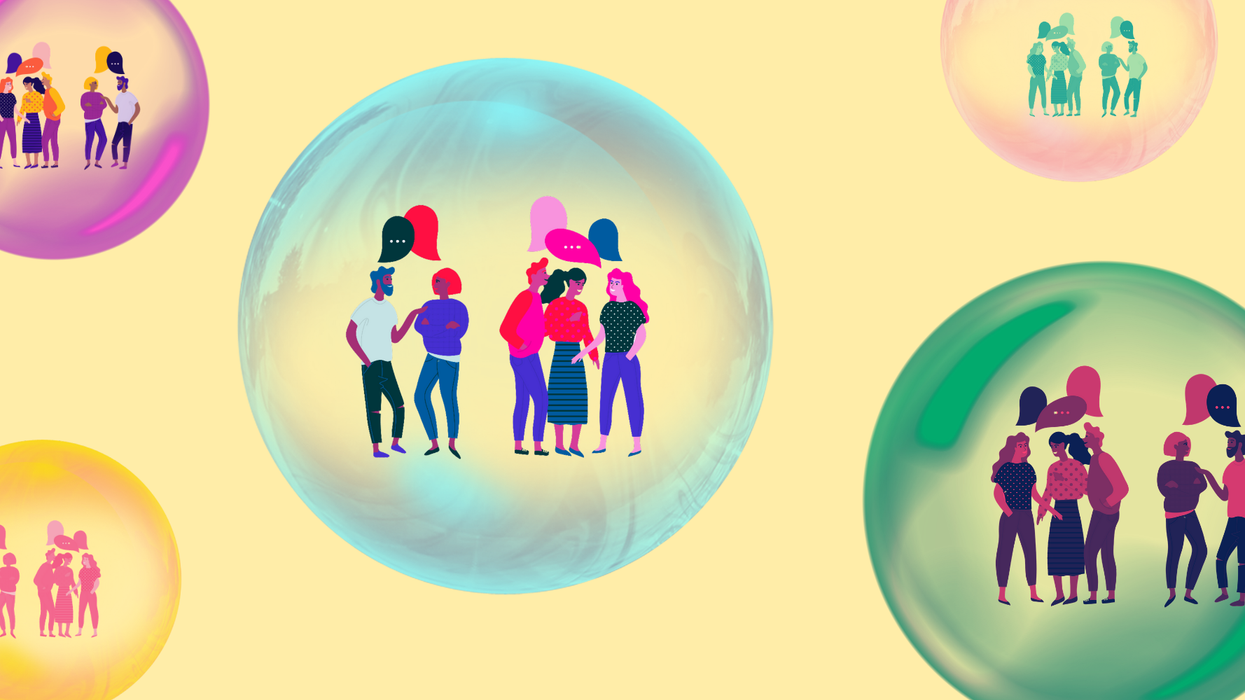News
Moya Lothian-McLean
May 01, 2020

iStock
Lockdown has proved a curious test for friendships. Surprisingly, it has given many dormant connections a kick up the arse; with time and Zoom now in abundance, reconnecting with mates you’d barely see before the pandemic has been a rare silver lining of the crisis.
Yet just as things seemed as settled as they could be during a world crisis, with the weekly quiz and wine night established and groupchats flourishing, comes a new concept to throw a spanner in the works.
One potential strategy now being floated by the government in order to loosen the rules of lockdown is social bubbles.
Sounds delightful. In theory, the concept is simple – people would be able to combine households with that of one or two others, with a maximum of 10 people. Those belonging to groups at particular risk from Covid-19, such as over-70s or immuno-suppressed individuals, will likely be advised not to join a social bubble and instead told to continue isolating.
A spokesman for Boris Johnson seemed to signal cautious early support for the idea on 29 April, The Guardian reported stressing that they were “very alive to the issue of social isolation and the need for mental wellbeing”. Meanwhile, last week the Canadian province of New Brunswick officially adopted the policy, providing a blueprint of how it could potentially map out in the UK.
Questions abound of course, such as the medical risk posed by merging two households if any members are key workers and regularly interacting with the general public. How those hundreds of miles from the household they would merge with, will proceed. How isolation will be combatted for those who have no household to form a bubble with, full stop. Whether families with offspring and grandparents living in separate houses will be forced to make a Sophie’s Choice.
But for many people who, for various reasons, wouldn’t merge households with their families, a new problem has arisen: that of friendship FOMO.
This idea of a "Social Bubble" has my anxiety levels rocketing. What if I'm not invited into a bubble? What if I AM… https://t.co/GtGov59Fci— Slusan J2M 📜🏳️🌈🦌 (@Slusan J2M 📜🏳️🌈🦌) 1588183713
“I’m scared of no one picking me and being left alone,” says James, who lives in London. He says he knows which friend he’d want to build the social bubble with but is uncertain whether they would select him in return.
“My friend Sam would be my ideal pick right now as he lives within walking or cycling distance of my house,” James tells me.
“But the chances of both him and the couple he lives with – who I don’t know that well – picking me over anyone else seem slim”.
He compares the situation to the ritual of ranking mates encouraged by early social media networks like MySpace or Bebo.
“When it was choosing your top 10 friends online, I wasn’t worried about that. Ten is quite a lot and I was pretty confident I’d be in the top 10 of anyone I’d pick. But the social bubbles idea is completely ill suited to the living situations of most young people today”.
Of course, social bubbles aren’t specifically designed to suit the living situations of young people, but then not much is in 2020, not even the living situations themselves.
The plight of ‘Generation Rent’ has been widely publicised, with 40 per cent of people born between 1980 and 1996 living in rented housing before they’re 30 and millennials spending an average quarter of their income on rent costs. Many of this group live with housemates, rather than alone or just with a partner. And these hodge podge houses, often composed of strangers or at least one or two people found on SpareRoom pose a new problem for the concept of social bubbles.
“How many households of say, four people, happen to be friends with another household of four people who are all friends with each other? That’s so rare,” says James.
How can it possibly work linking them up? Why should my friends get preference over the picks of my three other flatmates? Plus, the friends of my flatmates likely live with others as well. How will a choice ever be fairly made?
Even for those who are actually in the rare position of having all their friends living in small housing clusters, the FOMO still beckons.
“I don’t think I’ll get picked by my friends,” says Ben. “They all live near each other in two houses and I’m the odd one out as I live elsewhere. I don’t begrudge them but something like a social bubble can further exacerbate the loneliness and FOMO lockdown is already causing”.
Lydia tells me that the concept of a social bubble has stressed her out as it’s forcing her to confront a disagreement with her friends she’d been ignoring:
I have some friends who would be the obvious choice to join up with as we live near each other, our work overlaps, we’d have dinner together a lot and even went on holiday as a group before the pandemic.
However, Lydia and her friends fell out in mid-April when she learned they wanted to call the police on their neighbours over supposed violations of coronavirus guidelines.
Since then, there’s been no communication, she explains, but the thought of social bubbles is causing her to worry even more about the unresolved situation, knowing that it could force a confrontation either way, whether they try and merge their households or deliberately ice her out.
Simmering beneath the fears voiced by those who spoke to indy100 about the looming prospect of social bubbles seemed to be a common anxiety: that the pressure cooker scenario of forming a social bubble would lay bare the cracks and inequalities in their friendships, whether imagined or not.
As Cathy, who lives in Cardiff, observes, that stress is enough to offset the benefits of the idea altogether.
“I think that pressure would be weird and not like a nice, normal time,” she says. “What if you have different expectations? Or if one of you regrets it? I’d rather wait and see everyone properly”.
On the face of it, social bubbles seem like a perfectly rational idea and perhaps for many households struggling with the isolation of lockdown, they could prove a godsend.
But for a swathe of young people, stuck in crowded flatshares with disparate groups of friends and a raft of existing social anxieties about their place within those hierarchies, the bubble may have already burst.
Top 100
The Conversation (0)












